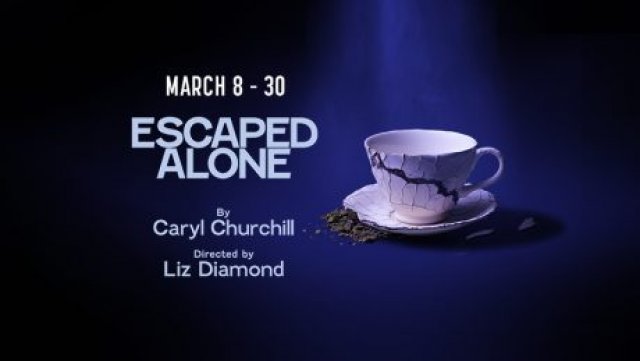Escaped Alone at Yale Rep should come with a warning label. Not for violence, sex, or x-rated language. It should warn those easily startled by sudden loud noises or blazing lights directed at the audience, that this may not be the show for you.
The Caryl Churchill play uses sounds and lights to indicate a transition from what is occurring on stage to what Mrs. Jarett is imagining will happen. Each is a type of environmental apocalypse.
Churchill is a prominent English playwright, best known for Cloud 9, Top Girls, and Serious Money, which I saw in London. Escaped Alone is a recent work. Her work has garnered mixed reviews with critics commending or complaining about an abundance of ideas, but which don’t end up as meaningful.
This play opens in an English garden on a summer afternoon. Three older women are chatting and having tea when they notice a woman looking at them. They invite the woman (Mrs. Jarett) in; they know her, but she is not an intimate of any of them. They chat about the mundane things of life and innocuous gossip which she joins. But, every five or ten minutes, the loud noises and lights come on. Mrs. Jarett stands, moves slightly forward, and describes another ecological disaster. The first is barrages of stones that force people to move underground. She ends each and returns to her chair and the trivial conversation as if nothing had happened. From stones, she moves on to rising water, chemicals, hunger, fire, and then rage.
At times, the other women also retreat from the conversation to reveal an individual crisis though these are not introduced by the sound and light. The most joyous moment is when the four let loose with “Hit the Road, Jack.”
The problem for the audience is what is Churchill’s intent in this short (55-minute) play. That normal life goes on while disaster lurks? That we acknowledge our own crises but not the world’s?
Perhaps Mrs. Jarett is a lunatic or a sci-fi madwoman. Are her descriptions of disasters, some of which are amusing, just fantasies? And what about the eccentricities of the other women – one killed her husband, and another is obsessively afraid that a cat has slipped into her hermetically sealed house?
I admit to still being perplexed. It kept reminding me of the Shakespeare lines from MacBeth, which begin “Tomorrow, and tomorrow, and tomorrow,/Creeps in this petty pace from day to day, To the last syllable of recorded time;” and ends with “It is a tale/
Told by an idiot, full of sound and fury, /Signifying nothing.”
The Yale Rep production, which runs through Saturday, March 30, has multiple pluses. The set designed by Lia Tublana truly recreates a British garden; you can almost smell the flowers. The costumes by Yu-Jung Shen establish these women as upper-middle class but also dowdy in their fashion sense. One might say they appear boring.
In addition, lighting designer Stephen Strawbridge and sound designer Sinan Refik Zafar cause us to jump out of our seats as each apocalyptic event begins. These events are illustrated by the imaginative and non-realistic projections by Shawn Lovell-Boyle.
That leads us to the cast, which is fine. LaTonya Borsay’s Mrs. Jarrett seems passive, even when recounting the horrors of the apocalyptic disaster. She is eternally calm. Mary Lou Rosato twists herself in her chair as Vi, the woman who killed her husband. It seems a reflection of her unease at her past. When she cruelly taunts Sally repeating the word “cat” you can believe she would kill. As Sally, Sandra Shipley calmly explains her obsessive rituals – and her lack of confidence in them – to ensure no cat has entered her house. Why she has this fear is never explained. As the third of the friends, Rita Wolf as Lena seems the least identified.
Liz Diamond has done her best to keep our attention focused on the characters. But I suspect that many members of the audience, like me, were distracted trying to figure our what it all was about.
For tickets, visit YaleRep.org.
This content is courtesy of Shore Publications and Zip06.com

